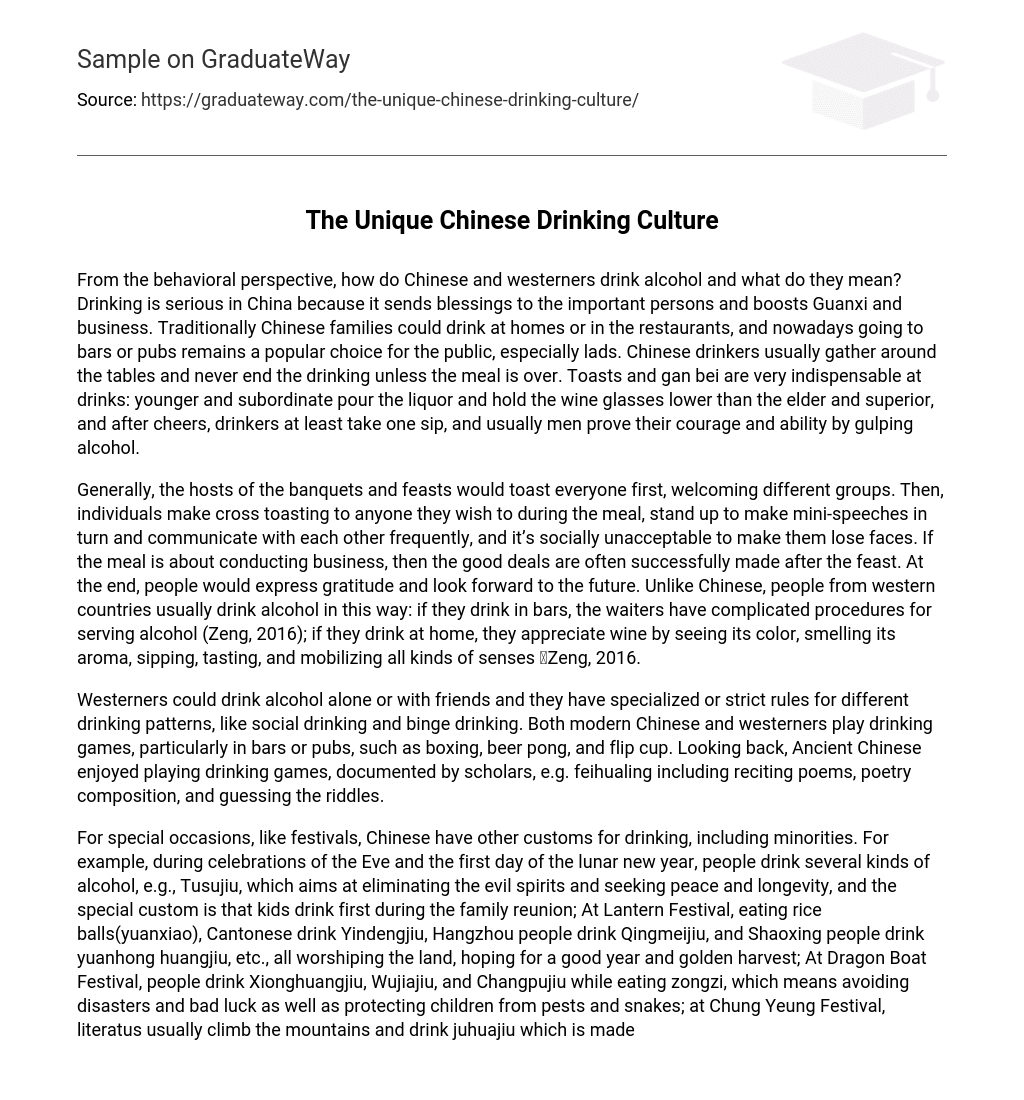From the behavioral perspective, how do Chinese and westerners drink alcohol and what do they mean? Drinking is serious in China because it sends blessings to the important persons and boosts Guanxi and business. Traditionally Chinese families could drink at homes or in the restaurants, and nowadays going to bars or pubs remains a popular choice for the public, especially lads. Chinese drinkers usually gather around the tables and never end the drinking unless the meal is over. Toasts and gan bei are very indispensable at drinks: younger and subordinate pour the liquor and hold the wine glasses lower than the elder and superior, and after cheers, drinkers at least take one sip, and usually men prove their courage and ability by gulping alcohol.
Generally, the hosts of the banquets and feasts would toast everyone first, welcoming different groups. Then, individuals make cross toasting to anyone they wish to during the meal, stand up to make mini-speeches in turn and communicate with each other frequently, and it’s socially unacceptable to make them lose faces. If the meal is about conducting business, then the good deals are often successfully made after the feast. At the end, people would express gratitude and look forward to the future. Unlike Chinese, people from western countries usually drink alcohol in this way: if they drink in bars, the waiters have complicated procedures for serving alcohol (Zeng, 2016); if they drink at home, they appreciate wine by seeing its color, smelling its aroma, sipping, tasting, and mobilizing all kinds of senses (Zeng, 2016.
Westerners could drink alcohol alone or with friends and they have specialized or strict rules for different drinking patterns, like social drinking and binge drinking. Both modern Chinese and westerners play drinking games, particularly in bars or pubs, such as boxing, beer pong, and flip cup. Looking back, Ancient Chinese enjoyed playing drinking games, documented by scholars, e.g. feihualing including reciting poems, poetry composition, and guessing the riddles.
For special occasions, like festivals, Chinese have other customs for drinking, including minorities. For example, during celebrations of the Eve and the first day of the lunar new year, people drink several kinds of alcohol, e.g., Tusujiu, which aims at eliminating the evil spirits and seeking peace and longevity, and the special custom is that kids drink first during the family reunion; At Lantern Festival, eating rice balls(yuanxiao), Cantonese drink Yindengjiu, Hangzhou people drink Qingmeijiu, and Shaoxing people drink yuanhong huangjiu, etc., all worshiping the land, hoping for a good year and golden harvest; At Dragon Boat Festival, people drink Xionghuangjiu, Wujiajiu, and Changpujiu while eating zongzi, which means avoiding disasters and bad luck as well as protecting children from pests and snakes; at Chung Yeung Festival, literatus usually climb the mountains and drink juhuajiu which is made of chrysanthemum, and it is said that juhuajiu can prolong life and get rid of diseases and disasters.
Currently, both China and the western countries like USA, Britain, Germany, have Beer Festivals which allow people to drink beer in various ways. The Beer Festival events are interesting and attractive, usually held at open venues with performance areas and game zones, and sell a lot of beer. The largest bear festival worldwide is Munich’s Oktoberfest in Germany, lasting less than 20 days from late September to early October with a parade. The beer festivals in western countries are closely connected to folk traditions. In contrast, the Qingdao International Beer Festival in China was started in 1991 and now is usually held between July and August as the largest beer festival in Asia with concerts, shows, competitions, and carnivals. Festivals drinking is the highlight of drinking culture at home and abroad.
The pros and cons of Chinese drinking are always the social focus. Some suggest that people drink a bit wine every day so that they could live longer and healthier; nevertheless, the experts always criticize the bad and ugly manners of Chinese wine culture which involves the negative impacts of guanxi, like “drink more” and being snobbish, or even the illegal deal of money and sex. The media discuss the consequences of alcoholism and expose bad behaviors and problems after intoxication like drunk driving which is banned by the government.





